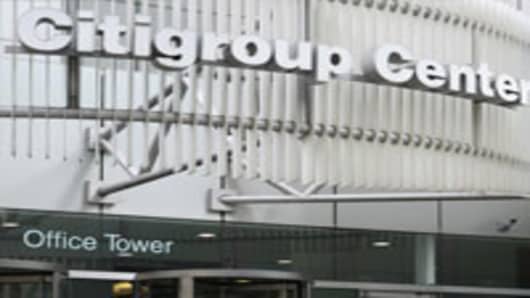Citigroupsaid Tuesday a huge write-down for mortgages triggered a nearly $10 billion quarterly loss, about twice analysts' estimates, and that it was raising $14.5 billion, slashing its dividend and cutting 4,200 jobs.
The capital infusion from investors including Singapore's government, former Citigroup Chief Executive Sanford "Sandy" Weill and Saudi Prince Alwaleed bin Talal, Citigroup's largest individual shareholder, may help the largest U.S. bank steer through the credit market and housing crises, though analysts said Citigroup faces a tough road ahead.
"People knew it would be a kitchen-sink quarter," said Matt McCormick, portfolio manager and banking analyst at Bahl & Gaynor Investment Counsel in Cincinnati. "I don't think they're out of the woods yet."
Citigroup's fourth-quarter loss of $9.83 billion was its first since the bank was created in 1998 from the merger of Citicorp and Weill's Travelers Group.
It stemmed largely from $18.1 billion of write-downs and related expenses for exposure to subprime mortgages, plus a $5.41 billion increase in credit costs, including a $3.85 billion charge to boost reserves.
The net loss of $1.99 per share was roughly twice as large as analysts expected. Citigroup cut its quarterly dividend 41 percent to 32 cents per share from 54 cents, a move that could save it about $4.4 billion a year.
"You expected the figures to be shocking," said Simon Maughan, an analyst at MF Global in London. "You cannot say it's definitively over but you have got to say this is probably the big one."
Citigroup shares fell 44 cents, or 1.5 percent, to $28.62 in pre-market trading. The shares have fallen 47 percent in the last year, compared with a 28 percent drop in the Philadelphia KBW Bank Index.
Raising Funds
Citigroup said it is raising $12.5 billion from a private sale of convertible preferred securities. It said this includes $6.88 billion from a Singapore fund, and investments from Weill and his family foundation, Alwaleed, the Kuwait Investment Authority, the money manager Capital Research & Management, and the state of New Jersey.
Citigroup also plans to sell an additional $2 billion of convertible preferred securities, and other preferred securities.
The new investments are on top of a $7.5 billion infusion that Citigroup got in November from Abu Dhabi's government, in exchange for a 4.9 percent stake.
"We are taking comprehensive action to position Citi for the future with the capital strength that will allow us to refocus on earnings and earnings growth," Vikram Pandit, who became chief executive in December, said in a statement. Pandit also called fourth-quarter results "clearly unacceptable."
Merrill Lynch, which has also faced billions of dollars of subprime losses, on Tuesday announced a $6.6 billion investment from Kuwait, the Korean Investment Corp and Japan's Mizuho Financial Group Inc. That's on top of a prior investment from Singapore's Temasek Holdings. Meanwhile, Alwaleed in a statement said his investment reflects his "strong support of Citigroup, and belief in its long-term success and profitability."
Large Write-Down
Mounting credit losses and a failure to consistently boost revenue faster than costs led to the November departure of Charles Prince as chief executive, and Pandit's elevation the following month.
Pandit joined Citigroup in July when the bank bought his hedge fund firm, Old Lane Partners, for $800 million. The $18.1 billion write-down includes $17.4 billion related to collateralized debt obligations, roughly twice the $8 billion to $11 billion that Citigroup had estimated on Nov 4.
Citigroup also in December brought billions of dollars of debt-laden structured investment vehicles onto its balance sheet, after an attempt to create a "super-SIV" to help sell those securities foundered after a lack of investor demand.
The 4,200 job cuts resulted in a $337 million charge. They are in addition to 17,000 cuts, representing about 5 percent of Citigroup's work force, announced last April, and are expected to be only a first installment of a larger work-force reduction planned for this year.
"Rather than a once and done effort," in head count reductions, "you will see a continual stream to reduce head count in non-productive businesses" throughout 2008, said Chief Financial Officer Gary Crittenden. This is "the first installment for 2008 and we're very focused on the remaining program for 2008."
The bank ended the year with a Tier-1 capital ratio of 7.1 percent, down from 7.32 percent on Sept. 30, though above the 6 percent that regulators say indicates a "well-capitalized" bank. The ratio measures a bank's ability to cover losses.
Citigroup said that if it completes the $12.5 billion offering and its planned purchase of Japanese brokerage Nikko Cordial, its Tier-1 ratio would be about 8.2 percent, above its 7.5 percent target.
"What Pandit's doing here is setting the table for 2008," said William Smith, chief executive of Smith Asset Management in New York. "The investment from Sandy Weill is a huge vote of confidence on his part. I'm surprised to see his name there."
--CNBC On-Air Editor Charles Gasparino contributed to this report.


